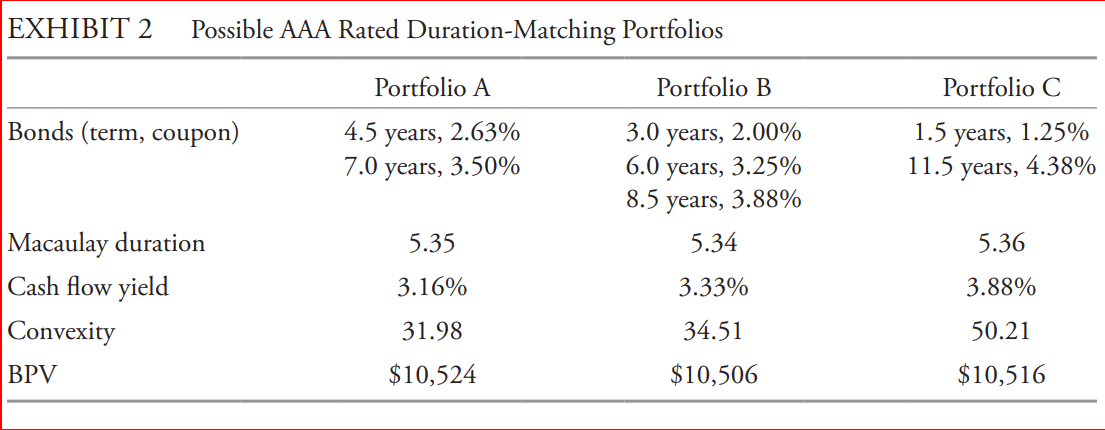The following information relates to Questions
Serena Soto is a risk management specialist with Liability Protection advisors. trey hudgens, CFo of Kiest Manufacturing, enlists Soto's help with three projects. The first project is to defease some of Kiest's existing fixed-rate bonds that are maturing in each of the next three years. The bonds have no call or put provisions and pay interest annually. exhibit 1 presents the payment schedule for the bonds.
EXHIBIT 1 Kiest Manufacturing Bond Payment Schedule as of 1 October 2017
The second project for Soto is to help hudgens immunize a $20 million portfolio of liabilities. The liabilities range from 3.00 years to 8.50 years with a Macaulay duration of 5.34 years, cash flow yield of 3.25%, portfolio convexity of 33.05, and basis point value (bPv) of $10,505. Soto suggested employing a duration-matching strategy using one of the three aaa rated bond portfolios presented in exhibit 2.
 Soto explains to hudgens that the underlying duration-matching strategy is based on the
Soto explains to hudgens that the underlying duration-matching strategy is based on the
following three assumptions.
1. yield curve shifts in the future will be parallel.
2. bond types and quality will closely match those of the liabilities.
3. The portfolio will be rebalanced by buying or selling bonds rather than using derivatives.
The third project for Soto is to make a significant direct investment in broadly diversified global bonds for Kiest's pension plan. Kiest has a young workforce, and thus, the plan has a long-term investment horizon. hudgens needs Soto's help to select a benchmark index that is appropriate for Kiest's young workforce and avoids the "bums" problem. Soto discusses three benchmark candidates, presented in exhibit 3.
 With the benchmark selected, hudgens provides guidelines to Soto directing her to (1)
With the benchmark selected, hudgens provides guidelines to Soto directing her to (1)
use the most cost-effective method to track the benchmark and (2) provide low tracking error.after providing hudgens with advice on direct investment, Soto offered him additional information on alternative indirect investment strategies using (1) bond mutual funds, (2)
exchange-traded funds (etFs) , and (3) total return swaps. hudgens expresses interest in using bond mutual funds rather than the other strategies for the following reasons.
reason 1 total return swaps have much higher transaction costs and initial cash outlay than bond mutual funds.reason 2 Unlike bond mutual funds, bond etFs can trade at discounts to their underlying indexes, and those discounts can persist.reason 3 bond mutual funds can be traded throughout the day at the net asset value of the underlying bonds.
-based on exhibit 1, Kiest's liabilities would be classified as:
Definitions:
Mere Exposure Effect
The mere exposure effect is a psychological phenomenon by which people tend to develop a preference for things merely because they are familiar with them.
Informational Social Influence
"The influence other people have on us because we want to be right."
Principle Of Proximity
A principle in psychology that suggests objects or shapes that are close to one another appear to form groups.
Observational Learning
Learning that occurs through observing and imitating another’s behavior.
Q2: Which of gerber's points about empirical duration
Q7: Support reaction <span class="ql-formula" data-value="C
Q7: resultant force <span class="ql-formula" data-value="R"><span
Q10: moment reaction at A in the
Q12: The variability of the coupon rate on
Q15: Tyo's assistant should calculate a forward rate
Q18: Which forward rate cannot be computed from
Q41: If a ball is thrown into
Q47: Find the exact value of
Q62: Find the area of the triangle